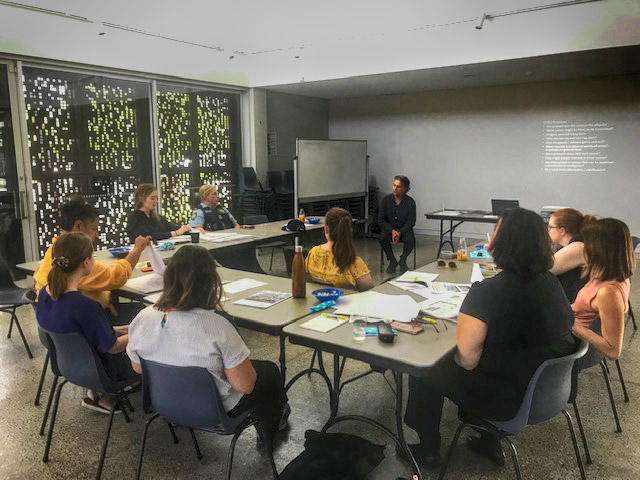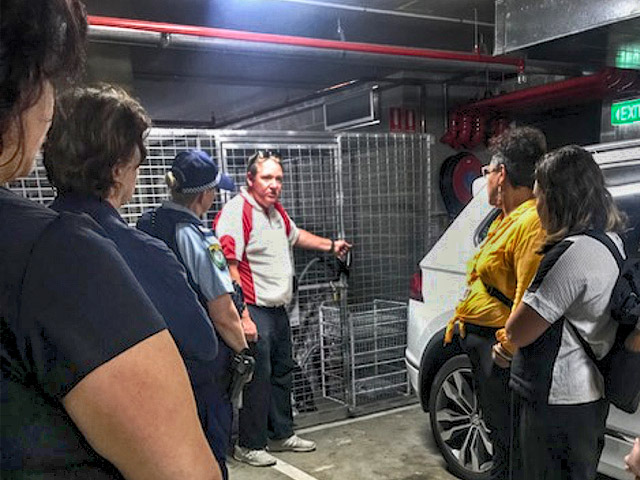Course: CPTED Training
John is currently running a range of different CPTED courses for a range of stakeholders including Government and Non-government organisations and the private sector. John offers a three day Introduction to CPTED course which provides participants with the background and theory relating to CPTED including its four key principles and more specific information about how to employ CPTED in a range of common urban settings and situations. The final day of the course has a focus on providing participants with the confidence and experience of using CPTED through an immersive group exercise where participants inspect a selected site which may carry a crime and/or safety risk and work together on developing CPTED context and recommendations for improving the safety and general liveability at a specific location such as a park, shopping centre, railway station, transport interchange, mixed use development or car park.
John offers a one day Intermediate CPTED course for those who have some knowledge of CPTED which focuses primarily on crime and liveability issues in common urban settings covering topics such as Mixed Use Development, Integrated Transport, Night Time Economies and Public Lighting, Walking and Cycling, Women’s Safety and the Gender Lens, Retail and Corporate Business Environments and Parks, Landscaping and Streetscapes. Each of these topics are also offered as separate half day modules or modules can be combined or customised as required.
John’s courses are open to all professions including Planners, Police, Architects, Urban Designers, Crime Prevention / Community Safety and Community Development workers and Security Consultants. His clients have included N.S.W. Police, N.S.W. Department of Planning and Environment, Transport N.S.W., City of Sydney, Inner West Council, Sutherland Council, Tamworth Council, Wollongong Council, Wagga Wagga Council, Shoalhaven Council, Newcastle City Council, Urbis, Arup and Stantec. John’s courses are administered by Local Government NSW who can be contacted at: Telephone:(02) 9242 4000, Email:learning@lgnsw.org.au or https://lgnsw.org.au/
About CPTED Training
Feeling safe is often about the “look” and the “feel” of the environments we find ourselves in. Dark and deserted public spaces may be avoided while we may be attracted to places which are animated by the presence of other people. These courses explores how human behaviour can be shaped by its interaction with the built environment around us and how criminal behaviour can be shaped in the same way. Crime Prevention Through Environmental Design (or “septed”) employs principles which seek to reduce and prevent opportunistic crime by planning and designing in specific settings to ensure that people can see and be seen, that only legitimate people gain access into and out of private spaces, that areas have a sense of ownership and activity and that public and private spaces are well managed and maintained.
The courses are largely image-based to capture the “look” and the “feel” of different situations in different environments and are designed to be interactive encouraging participants to share their stories, experiences and insights.
John’s CPTED training sets out to demonstrate that safe, liveable and sustainable towns and cities are at least partly the result of good urban design and architecture used sensitively to not only produce attractive and well-maintained environments but also to discourage criminal and anti-social behaviour.
Course Content Includes:
- Safe and Unsafe Places
- Perceptions and Fear of Crime
- Causes of Crime
- Introduction to Crime Prevention
- Situational Crime Prevention
- CPTED International Standard and Legislation
- 2nd Generation CPTED and the Social environment
- 3rd Generation CPTED, Liveability and Sustainability
- Surveillance – to see and be seen
- Access Control and Movement
- Territorial Reinforcement, Activity and Ownership
- Environmental Management and Maintenance
- CPTED and Neighbourhood Dwellings
- CPTED and Apartment Living
- CPTED and Retail Stores
- CPTED, Licensed Premises and the Night Time City
- CPTED in Streets, Plazas, Parks and Open Spaces
- CPTED and Public Toilets
- CPTED and Public Transport and Car Parks
- Application of CPTED
- CPTED and Masterplanning
- CPTED and Development Assessment
- CPTED and specific Projects
- CPTED Site and Risk Assessments
- CPTED and Community Safety Audits


Each component includes exploring broader crime and safety issues which are unique to these settings including:
- Public lighting
- Women's Safety and Gender Equality
- Closed circuit television
- Homelessness
- Landscaping
- Night time economies
- Anti-social behaviour
- Graffiti
- Contested & problematic public spaces.
Participants will come away from the courses with the knowledge of which crimes to look out for in a range of settings and how CPTED principles can be employed in each different setting as a crime prevention measure. Through developing lines of inquiry which focus on applying a series of specific questions which establish the site context provided in a detailed manual, participants will be equipped to provide CPTED comments and recommendations in a range of settings and situations. The courses aim to not only create safer and better environments and improve safety and security in communities but to contribute to broader quality of life.
Course: Women's Safety in Public Places
Safer Public Spaces for Women and Girls – Planning and Designing through the Gender Lens
For hundreds of years town and city making has been the domain of male politicians, architects, engineers and planners. From suburbs, street names, signs and advertising billboards, monuments and the ways public spaces have been built by and dominated by men, patriarchy in city planning has reinforced the territory of men and the gender stereotyping of women. This is arguably not just a failure of our society but a failure of possibility since as the United Nations has pointed out “when a space is occupied by women and girls, it is also occupied by more people in general.” Public space can either exacerbate gender inequality or improve outcomes for those marginalised by it so it is critical to recognise that gender and gender relations between women and men are key factors in how safe urban spaces are organised and developed.
Although domestic and workplace violence is now widely recognised as a human rights violation, sexual harassment and other forms of violence against women and girls in public spaces are often neglected, with few laws or policies in place to prevent and address it. In the workplace for example there are rules to be followed, departments to hear grievances, and punishments issued to offenders. But out on the street, on public transportation, in licensed venues and parks and reserves that line is frequently blurred or nonexistent. What may sound like a simple hello to some can come across as threatening to a woman trapped in a train carriage? Being followed, wolf whistled or inappropriately touched or assaulted by male strangers or acquaintances in public areas can have lasting physical and psychological effects on women and girls. Much of it is subtle, not easy to identify and difficult to report and invariably involves men exploiting situations in locations where they may isolate a woman or girl when there is no one else around or where their actions may blend in with a crowd. All these situations reinforce the point that public spaces need to be designed for all including through the gender equity lens.
This new one-day course based on empirical evidence conducted by women with women examines gender bias in urban environments and the role that gender has played in constructing cities and systems throughout history. It provides participants with the tools on how to understand feminist perspectives and approaches to urban planning and design, architecture, transportation and policy. The course explores the many ways women and girls navigate towns and cities in a profoundly different way than men in order to feel respected and safe serving as a reminder that public space is not neutral and that the design of such spaces can either facilitate or impede their use, appropriation and safety for women and girls. It explores notions of civic responsibility in public places and considers a range of practical interventions in a range of situations for both men and women in terms of identifying and intervening to reduce sexual harassment and assault as there is evidence that while many people witness sexual harassment in public places they are unsure what to do as there is a lack of training on how to intervene.
Finally the course content includes exploring what other towns and cities are doing world-wide to highlight and address women and girls’ safety in public areas. The course is open to anyone interested in improving their ability to critically assess urban development from a gender equitable lens and to advance the conversation around empowering women and girls to play a greater role in making and shaping safer environments in towns and cities.
Contact Local Government NSW at: Telephone:(02) 9242 4000 or Email: learning@lgnsw.org.au or https://lgnsw.org.au/Public/Public/Events/Learning-and-Development/Courses_staff.aspx
